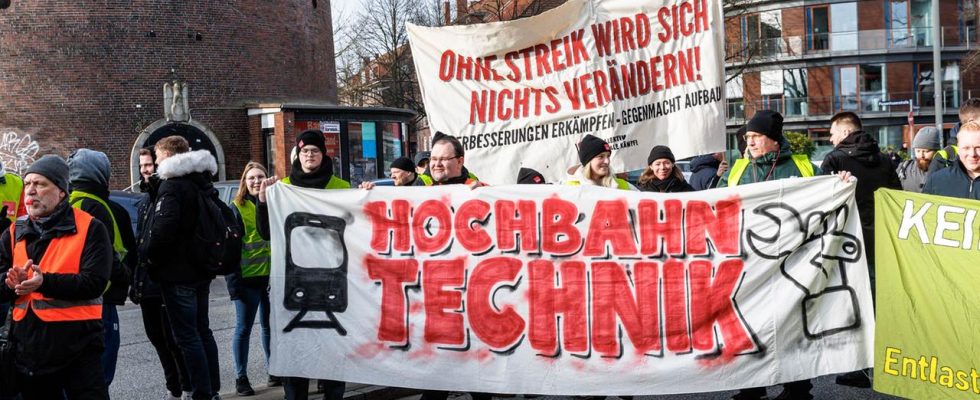faq
The second warning strike in local public transport will reach its climax tomorrow with a joint day of action by ver.di and Fridays for Future. tagesschau.de answers the most important questions about the cancellation of buses and trains.
Why is there even a strike again?
Collective bargaining in local public transport is stalling. There have been several warning strikes in individual federal states in the past few weeks. On February 2nd, ver.di also went on strike on public transport in a nationwide coordinated action. However, the signal “apparently was not sufficiently understood,” said ver.di deputy chairwoman Christine Behle.
Collective bargaining in the individual federal states continued to produce no results. “In order to finally bring movement into the negotiations, pressure must now be put on the employers again,” said Behle.
What are the demands?
Ver.di is mainly concerned with improving working conditions and relieving the burden on employees – for example by shortening weekly working hours, increasing vacation entitlement, additional relief days for shift and night work, and limiting shared services and unpaid times in driving service.
According to Ver.di boss Frank Werneke, the focus is also on climate protection. “It is also primarily about making public transport sustainable as a key mode of transport and thus setting the decisive course for a successful transport transition,” he wrote in a message to the dpa news agency. This not only benefits the employees and passengers, but also the climate in the long term.
The climate group Fridays For Future (FFF) supports the union with demonstrations in around 100 cities. Fridays For Future activist Luisa Neubauer emphasized that the group was fighting side by side with ver.di “for climate protection, a real transport transition and long overdue investments in public transport”. “Instead of the austerity policies of the day before yesterday, we now need investments for the country, the people and the climate.”
How big will they get? restrictions for passengers?
The exact effects will only become apparent on Friday. But they are likely to be drastic: According to ver.di, around 90,000 employees in over 130 municipal companies have been called on a warning strike – a third of them in the around 30 companies in North Rhine-Westphalia alone. Almost all large local public transport companies such as KVB (Cologne), Rheinbahn (Düsseldorf), DSW21 (Dortmund), the Münster municipal utility and moBiel (Bielefeld) are on strike.
According to the union, a total of more than 80 cities and around 40 rural districts were affected by the work stoppage at the beginning of February. However, the consequences are likely to vary greatly depending on the region. In many federal states, the warning strike started in the morning. Buses, trams and subways were at a standstill in many places.
Where is the warning strike already underway – and where not yet?
In addition to North Rhine-Westphalia, Lower Saxony, Berlin, Brandenburg, Baden-Württemberg, Rhineland-Palatinate, Saxony, Saxony-Anhalt and Thuringia were also affected. Things have also come to a standstill in Hamburg and Schleswig-Holstein. The employees of the Hamburger Hochbahn (HVV) and the Hamburg-Holstein transport company (VHH) took part in the strike, which led to a widespread standstill of public transport in the Hanseatic city and parts of Schleswig-Holstein.
According to a statement from HVV and VHH, all buses and trains remain in depots: “If passengers set off with the prospect of an emergency timetable and crowd into overcrowded vehicles or on platforms, this would pose a high safety risk,” it says in this. There were also only a few city or regional bus routes in the other federal states. On Friday, the mostly two-day strike also reaches Hesse, Mecklenburg-Western Pomerania and Bremen.
Are there exceptions?
S-Bahn or regional buses that are not operated by municipal employers are not affected by the labor disputes. For example, the S-Bahn continues to run in Berlin, as well as in Frankfurt am Main. The Frankfurt Transport Company (VGF) also pointed out on its website that the city buses are expected to run.
In addition, regional and long-distance rail transport is not on strike and runs according to the usual timetable. An exception is also the state of Bavaria, where the collective agreement has not been terminated. There is no longer any threat of strikes in Saarland either. There, the employers and ver.di agreed on a new collective agreement for local transport on Wednesday.
According to the Saar Municipal Employers’ Association (KAV Saar), the agreement reached includes, among other things, inflation compensation payments of 1,000 euros and the transfer of the collective agreement for the public sector from June 1st. A Saturday surcharge and a sick pay subsidy will also be introduced. The annual special payment increases from 85 percent to 100 percent of a monthly salary.

